 EDITOR'S PICK
EDITOR'S PICK
Rivian's Also: A Billion-Dollar Bet on Small Electric Vehicles
18 Aug 2025 | Synopsis
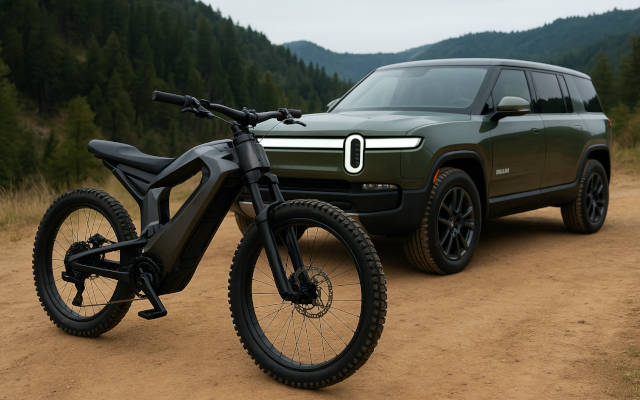 Rivian's spin-out, Also, is a billion-dollar bet on premium small-format EVs like e-bikes and scooters. Incubated as "Project Inder," it's now a standalone company backed by Greenoaks Capital. With design input from Jony Ive's LoveFrom and Rivian's tech, Also aims to bring connected, stylish micromobility to urban markets. Though no products are launched yet, its strategy blends Rivian's infrastructure with startup agility..."
Rivian's spin-out, Also, is a billion-dollar bet on premium small-format EVs like e-bikes and scooters. Incubated as "Project Inder," it's now a standalone company backed by Greenoaks Capital. With design input from Jony Ive's LoveFrom and Rivian's tech, Also aims to bring connected, stylish micromobility to urban markets. Though no products are launched yet, its strategy blends Rivian's infrastructure with startup agility..."Ben & Jerry’s Ditches ICE For Rivian’s Van
18 Aug 2025 | Synopsis
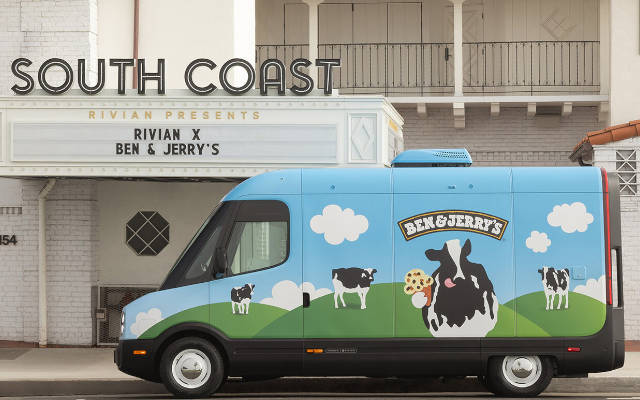 Rivian and Ben & Jerry’s have teamed up to create two all-electric "scoop trucks" built on Rivian's Commercial Van platform. Debuting at SXSW in Austin, the eco-friendly vehicles boast a 161-mile range and combine refrigeration and serving windows inside. After the launch, they'll travel nationwide...to bring scoops with less noise, emissions, and fossil-fuel reliance...showcasing Rivian's commercial EV versatility..."
Rivian and Ben & Jerry’s have teamed up to create two all-electric "scoop trucks" built on Rivian's Commercial Van platform. Debuting at SXSW in Austin, the eco-friendly vehicles boast a 161-mile range and combine refrigeration and serving windows inside. After the launch, they'll travel nationwide...to bring scoops with less noise, emissions, and fossil-fuel reliance...showcasing Rivian's commercial EV versatility..."10 Hot Electric Vehicle Deals Where Battery Range Meets Affordability
17 Aug 2025 | Synopsis
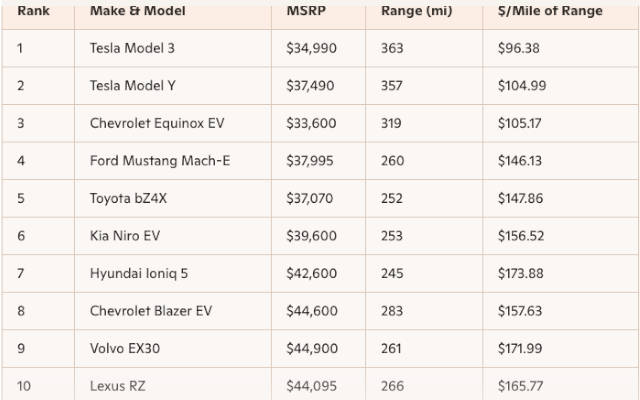 For 2025, several EVs balance affordability and range. Forbes highlights 10 models under $45K with at least 245 miles per charge. Top values include the Tesla Model 3 ($34,990/363 mi), Tesla Model Y ($37,490/357 mi), Chevy Equinox EV ($33,600/319 mi), Ford Mustang Mach-E ($37,995/260 mi), and Toyota bZ4X ($37,070/252 mi). But if you're looking for more "bang for the buck" in range, MS Copilot LLM created the above table for EVWorld.com.
For 2025, several EVs balance affordability and range. Forbes highlights 10 models under $45K with at least 245 miles per charge. Top values include the Tesla Model 3 ($34,990/363 mi), Tesla Model Y ($37,490/357 mi), Chevy Equinox EV ($33,600/319 mi), Ford Mustang Mach-E ($37,995/260 mi), and Toyota bZ4X ($37,070/252 mi). But if you're looking for more "bang for the buck" in range, MS Copilot LLM created the above table for EVWorld.com.Volkswagen Delivers The 1.5 millionth All-Electric ID. Model
17 Aug 2025 | Synopsis
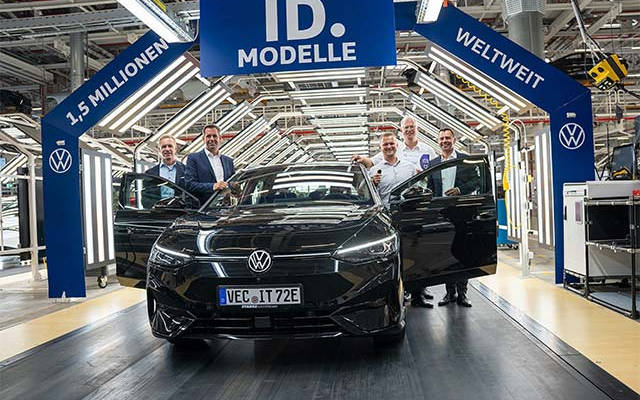 Volkswagen just delivered the 1.5 millionth all-electric ID model, a black ID.7 Tourer Pro, at its Emden plant in Germany, marking a major milestone in its electromobility push. The car, boasting a range of up to 606 km, was handed over in the presence of VW executives and Lower Saxony's Minister President. Emden - Sone of only three VW factories fully dedicated to EVs - reflects over €1 billion in investment.
Volkswagen just delivered the 1.5 millionth all-electric ID model, a black ID.7 Tourer Pro, at its Emden plant in Germany, marking a major milestone in its electromobility push. The car, boasting a range of up to 606 km, was handed over in the presence of VW executives and Lower Saxony's Minister President. Emden - Sone of only three VW factories fully dedicated to EVs - reflects over €1 billion in investment.Electric Litigation In the Air
17 Aug 2025 | Synopsis
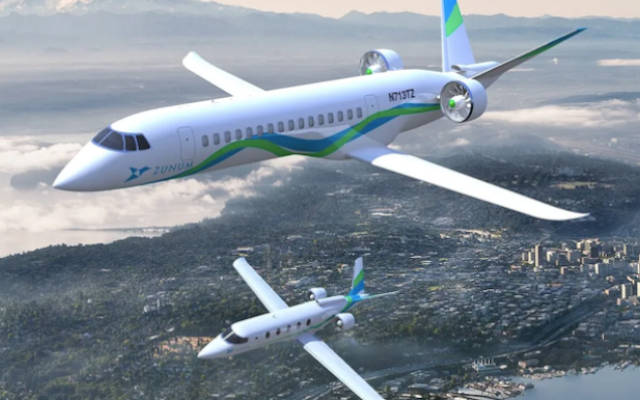 A U.S. appeals court reinstated an $81M judgment against Boeing for interfering with Zunum Aero, an electric plane startup it once funded. The ruling highlights tensions between Boeing's role as investor and competitor in advanced air mobility. Boeing's backing of Wisk Aero, which settled a trade secrets fight with rival Archer, further underscores conflicts of interest as aerospace giants shape the future of electric and autonomous flight.
A U.S. appeals court reinstated an $81M judgment against Boeing for interfering with Zunum Aero, an electric plane startup it once funded. The ruling highlights tensions between Boeing's role as investor and competitor in advanced air mobility. Boeing's backing of Wisk Aero, which settled a trade secrets fight with rival Archer, further underscores conflicts of interest as aerospace giants shape the future of electric and autonomous flight.
 Si Exclusive
Si Exclusive
Hydrogen's Flight Path: Fuel Cells, Turbines, and the Economics of Clean Aviation
10 Oct 2025 |  Aviation is shifting from Jet A to four fuel systems: electricity, hydrogen (fuel cell and combustion), SAF, and petroleum. Fuel cells suit short-haul aircraft; hydrogen combustion may power long-range jets. SAF bridges legacy fleets. Hydrogen costs - $5-$7/kg today, possibly $2/kg by 2040 - impact ticket prices and infrastructure decisions. Airport authorities, airlines, and governments will share deployment costs. Each fuel has distinct environmental pros and cons shaping aviation's net-zero future.
Aviation is shifting from Jet A to four fuel systems: electricity, hydrogen (fuel cell and combustion), SAF, and petroleum. Fuel cells suit short-haul aircraft; hydrogen combustion may power long-range jets. SAF bridges legacy fleets. Hydrogen costs - $5-$7/kg today, possibly $2/kg by 2040 - impact ticket prices and infrastructure decisions. Airport authorities, airlines, and governments will share deployment costs. Each fuel has distinct environmental pros and cons shaping aviation's net-zero future.
Ferrari Elettrica: Electrified, Not Tamed
09 Oct 2025 |  Ferrari's Elettrica EV delivers over 1,000 hp via quad motors, hitting 0-100 km/h in 2.5s with a 330+ mile range. Its 122 kWh battery sits low for balance, paired with active suspension and rear steering. Designed by LoveFrom, the four-door GT aims to preserve Ferrari's emotional DNA. Priced around $580K, it launches in 2026 in Europe and the U.S., with hybrids and ICE models still dominating until 2030
Ferrari's Elettrica EV delivers over 1,000 hp via quad motors, hitting 0-100 km/h in 2.5s with a 330+ mile range. Its 122 kWh battery sits low for balance, paired with active suspension and rear steering. Designed by LoveFrom, the four-door GT aims to preserve Ferrari's emotional DNA. Priced around $580K, it launches in 2026 in Europe and the U.S., with hybrids and ICE models still dominating until 2030
Are Self-Driving Cars Safer Than Humans? The Data May Surprise You
09 Oct 2025 |  Studies show autonomous vehicles (AVs) are generally safer than human drivers, avoiding most rear-end and broadside crashes and performing better in poor weather. However, AVs struggle with complex maneuvers like unprotected turns and low-light conditions. If AVs are just 10% safer, they could prevent 600,000 U.S. deaths over 35 years. As EVs become autonomy platforms, safety depends on how well they interpret real-world scenarios
Studies show autonomous vehicles (AVs) are generally safer than human drivers, avoiding most rear-end and broadside crashes and performing better in poor weather. However, AVs struggle with complex maneuvers like unprotected turns and low-light conditions. If AVs are just 10% safer, they could prevent 600,000 U.S. deaths over 35 years. As EVs become autonomy platforms, safety depends on how well they interpret real-world scenarios
 11 Oct 2025 14:36:38 UTC |
RECENT PODCASTS
BYD Soars - Cheaper Tesla Models - The Bolt is Back - Rivian
SEARCH RSSTREAM
 37 New Postings In Past 24 Hours
37 New Postings In Past 24 Hours
Category:mobility
Region:Europe
Date:11 Oct 2025
Category:finance
Region:NoAmerica
Date:11 Oct 2025
Category:finance
Region:NoAmerica
Date:11 Oct 2025
Category:finance
Region:NoAmerica
Date:11 Oct 2025
Category:mobility
Region:NoAmerica
Date:11 Oct 2025
Category:energy
Region:Europe
Date:11 Oct 2025
Category:mobility
Region:NoAmerica
Date:11 Oct 2025
Category:review
Region:NoAmerica
Date:11 Oct 2025
Category:mobility
Region:NoAmerica
Date:11 Oct 2025
Category:mobility
Region:Europe
Date:11 Oct 2025
Category:mobility
Region:Europe
Date:10 Oct 2025
Category:energy
Region:Global
Date:10 Oct 2025
Category:mobility
Region:SoAmerica
Date:10 Oct 2025
Category:energy
Region:NoAmerica
Date:10 Oct 2025
Category:mobility
Region:NoAmerica
Date:10 Oct 2025